SBASSE and Covid-19
Syed Babar Ali School of Science and Engineering is playing its part in the research of Covid-19 and has deployed innovative new ways to meet the challenges of distant learning.
Covid-19 Times
Continuing the journey through difficult times
Syed Babar Ali School of Science and Engineering (SBASSE) has been hard at work to evolve its academic, research and public outreach portfolio during the COVID-19 pandemic. We have compiled stories in two categories; evolving education and research for Covid-19. These reflect the dedication and hard work of the SBASSE family – those who are not willing to give up their work, come what may.
EVOLVING EDUCATION
SBASSE’s Cloud Classrooms

We believe that difficult times always bring with them an opportunity to learn, adapt and evolve. Tapping into this opportunity, SBASSE is combining virtual classrooms with real learning by introducing a blended learning solution that will enable learning from the comfort of your home!
Riding the coattails of technology, education has never been more accessible. Using an internet connection and a computer (or even your smartphone), you can access the familiar classroom environment with the best view in the house! Coupled with lectures given by our world-class faculty, we truly believe this will provide our students with the best way possible to utilise resources at home for keeping up with their education needs.
Four classrooms in SSE have been dedicated to deploying this low-cost, high impact solution to distant learning. Roving cameras, instructor-controlled zoom, full wall projection of participants for maximum immersiveness, ability to record and display multiple views - these are some of the technical capabilities of our cloud classrooms. We welcome other educational institutes to replicate this setup for their students and will be happy to share relevant details.
Our faculty and administrative teams are excited and looking forward to seeing how this project will help our students make the best of their time away from the classroom.
Click here to download the guidelines for the SBASSE Virtual Classrooms.
ڈیجیٹل رسائی، عمدہ پڑھائی
ہر مشکل گھڑی اپنے ساتھ سیکھنے کے ڈھیروں مواقع لاتی ہے۔ ایسے ہی ایک موقع سے استفادہ کرتے ہوئے لمز کے اسکول آف سائنس اینڈ انجینئرنگ نے اپنی کلاسز کی ڈیجیٹل فراہمی کا آغاز کیا ہے، جس کی مدد سے طلبہ اپنے گھروں سے با آسانی پڑھائی کا سفر جاری رکھ سکتے ہیں۔
ٹیکنالوجی کی مدد سے علم کی رسائی نہایت آسان ہو چکی ہے۔ انٹرنیٹ اور کمپیوٹر (یا موبائل فون) کے استعمال سے آپ جہاں کہیں بھی ہوں، مجازی طور پر کلاس روم میں بیٹھ سکتے ہیں۔ تو کیوں نہ اس سہولت کو بہترین اساتذہ کے تدریسی تجربے کے ساتھ ضم کر دیا جائے؟
اسکول آف سائنس اینڈ انجینئرنگ میں چار کمرے اس مقصد کے لیے مختص کر دیے گئے ہیں۔ حرکت پذیر، قابلِ زوم کیمرے، آن لائن شرکت کردہ طلبہ کی تصویر کو پوری دیوار پر دکھانے والا پروجیکٹر اور لیکچر کومختلف زاویوں سے ریکارڈ کرنے کی صلاحیت - یہ اس کلاس روم کی چند خصوصیات ہیں۔ دیگر تعلیمی ادارے جو اس طرح کے منصوبے نصب کرنا چاہتے ہوں، ہم سے تفصیلات طلب کر سکتے ہیں۔
امید ہے اس طرح کم قیمت میں بہتر اور موثر طریقے سے علم کی فراہمی میسر کی جا سکے گی۔
Portable Lab Kits - A Commitment To Continued Learning
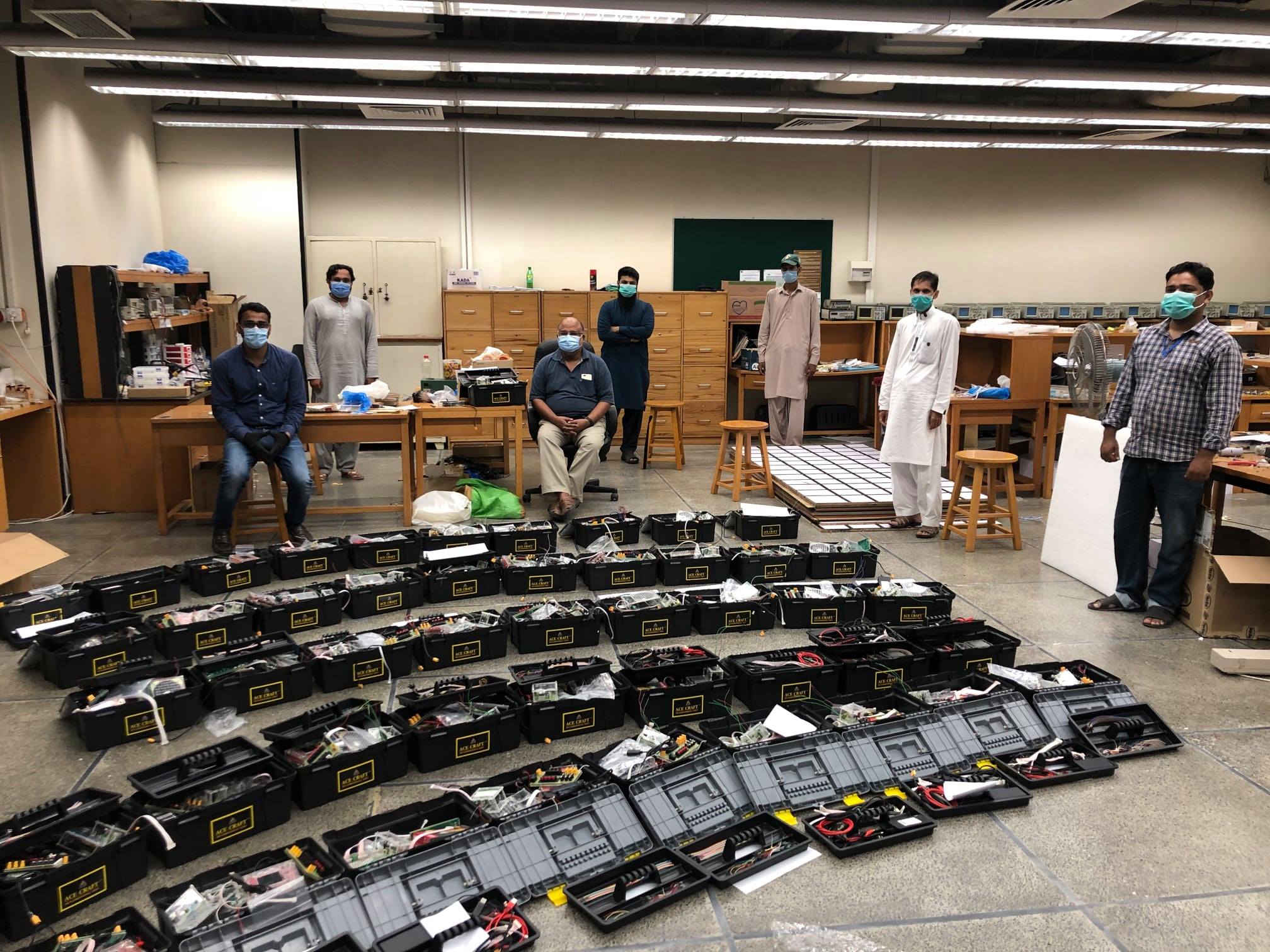
Surely one cannot provide students with meaningful hands-on learning experience through packets of information sent over the internet, processed in a server and received on a computer. Some things in life are meant to work best when tangible. One such thing is learning enabled by the laboratory.
Worried by this barrier in hands-on learning, Dr. Jahangir Ikram and his team, with support from the EE
Department Chair, worked hard to successfully develop low-cost kits for students, to continue learning even outside of the lab, from the comfort of their homes. It is fair to say that Dr. Jahangir and team made the lab come to the students rather than vice versa.
Each kit contains a variety of necessary tools including micro controllers, LED matrix, programmable chips, digital to analog converter, an oscilloscope, power distribution core, a complete tool set, multimeter, speed controllers and motors. The oscilloscopes had to be imported from China to meet the goal of making the kit cheaper, more affordable.
In the heat and humidity of the past three months, 50 kits were successfully developed and Dr. Jahangir’s team had gone to lengths with making sure no compromise was made in quality and effectiveness of the kits. The kits will be used for the EE 324 course that focuses on micro controllers interfacing and assembly language program.
We congratulate Dr. Jahangir and his department on leading this initiative and appreciate his interest in extending technical support to other universities in case they’d like to replicate this project.
Course on Differential Equations
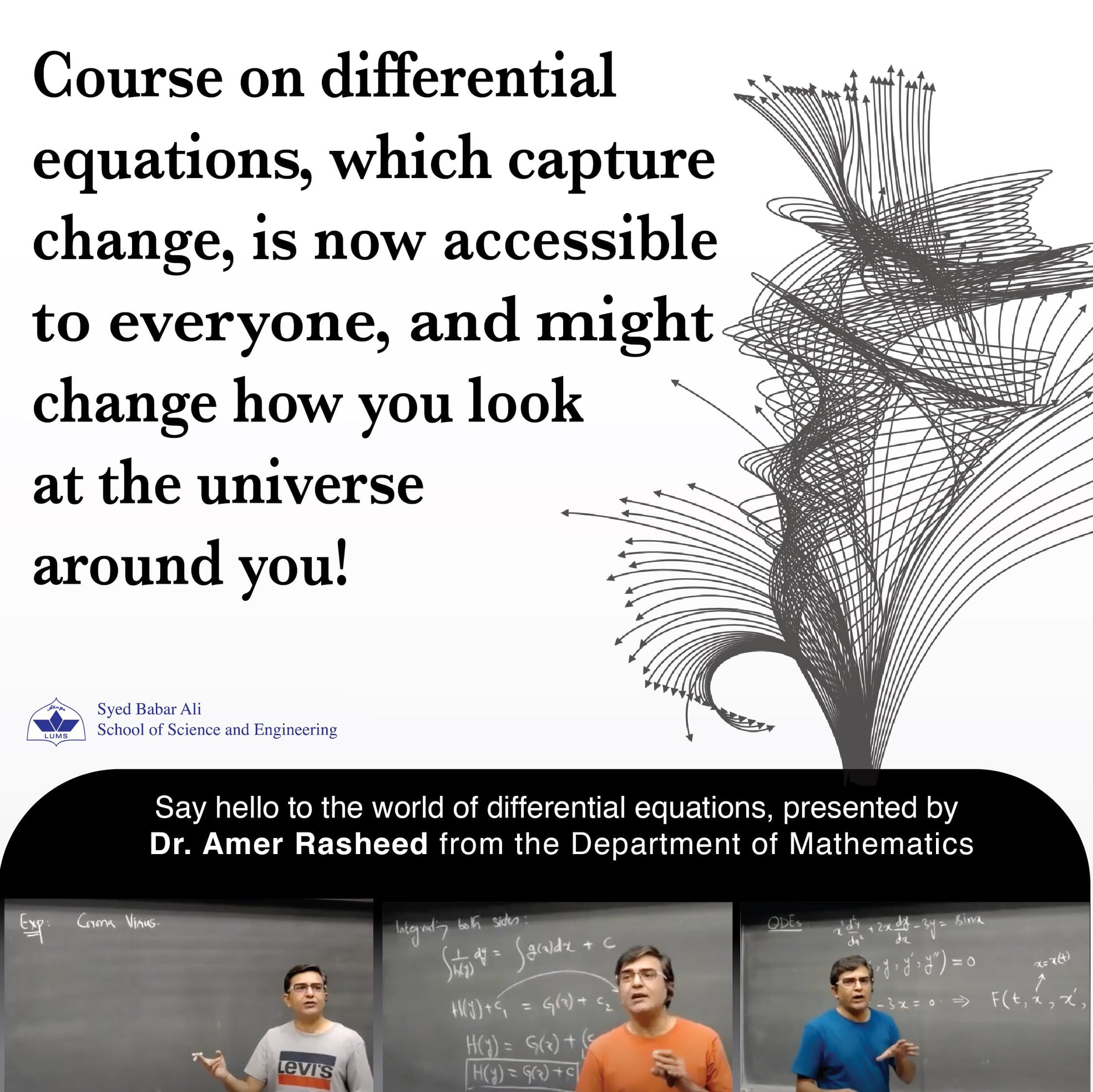
We use them to predict progression and regression of disease, how well your favourite smartphone did against the competition, the way plasma twists and turns on the boiling, roiling surface of the Sun and if you ever feel like figuring out the age of the Earth itself. Welcome to the world of differential equations! Oh and, if they get too hard – we can always use graphs and pretty plots to look at their solutions.
Say hello to the world of differential equations, recordings of a class, presented on YouTube by Dr. Amer Rasheed from the department of Mathematics.
Dr. Amer Rasheed, who uses differential equations to make a living, took inspiration for his teaching in this covid-impacted semester, from classrooms filled with empty chairs and silence and decided to create content that could be delivered to a broader audience both inside and outside of LUMS. Dr. Amer was able to achieve this through smart class technology that can make education outreach easy, even from the confines of a physical classroom.
We believe that this course will help many physics, mathematics and engineering majors through its free distribution on a public platform. In SBASSE, LUMS, this is a required course for many physical science and all maths students. The course deals with first order
differential equations, system of first-order linear equations, introduction to special functions, Fourier series, partial differential equations and much more!
Course on Classical Genetics
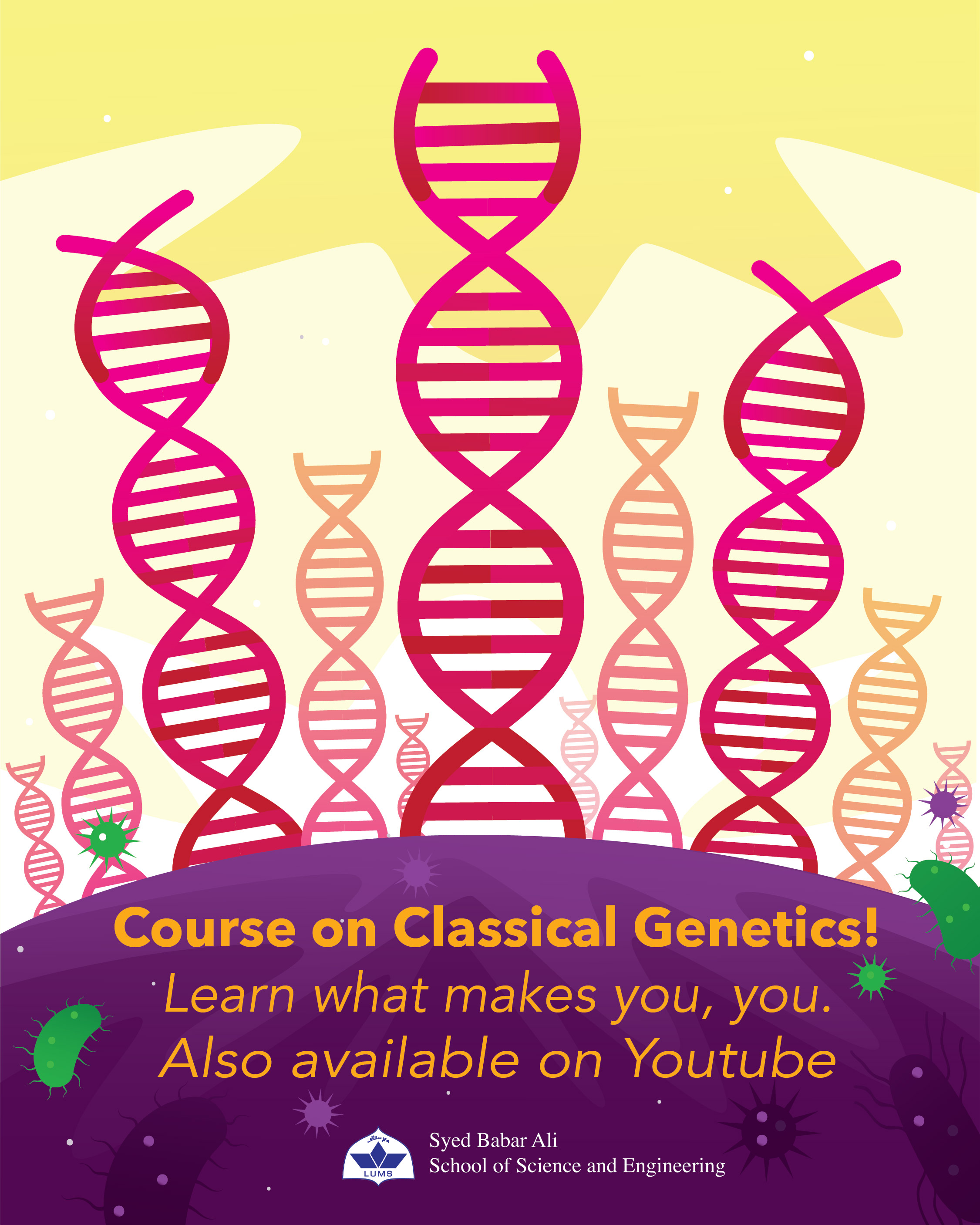
Earth - a biosphere. A complex, subtly balanced life support system. It is home to us, our ancestors and everyone you’ve ever known or will ever know. On it, most life looks nothing like its biological peers. Every specie is different, every face – like no other. Life owes this beautiful and fascinating diversity to a complex set of instructions, buried deep within itself. We are an expression of the wishes of our genes. We are the physical manifestation of genetics.
The beauty of being a passionate educator is in imparting knowledge. Hence, the Department of Biology at SBASSE, LUMS is introducing an online course on Classical Genetics, by Dr. Muhammad Tariq, that aims to take you on a genetic journey that begins with introductory topics like heredity, variation, alleles – all the way to the netherealm of mutations. The course offers a detailed study on bacterial mutants generated through transposon mutagenesis and how bacteria can exchange genetic material through transformation, conjugation and transduction.
Classical Genetics is a 221 level course that has been carefully designed by Dr. Tariq to cover basic yet important topics which students from both within and outside of LUMS can benefit. The course can be revisited as many times as necessary and aims to offer clarification, in depth insight and detailed analysis of a multitude of subtopics and concepts, which are an essential requirement for sophomore students. SBASSE is bringing quality education to the masses through free-for-all, public-access series of lectures – also available on YouTube.
Course on Environmental Science
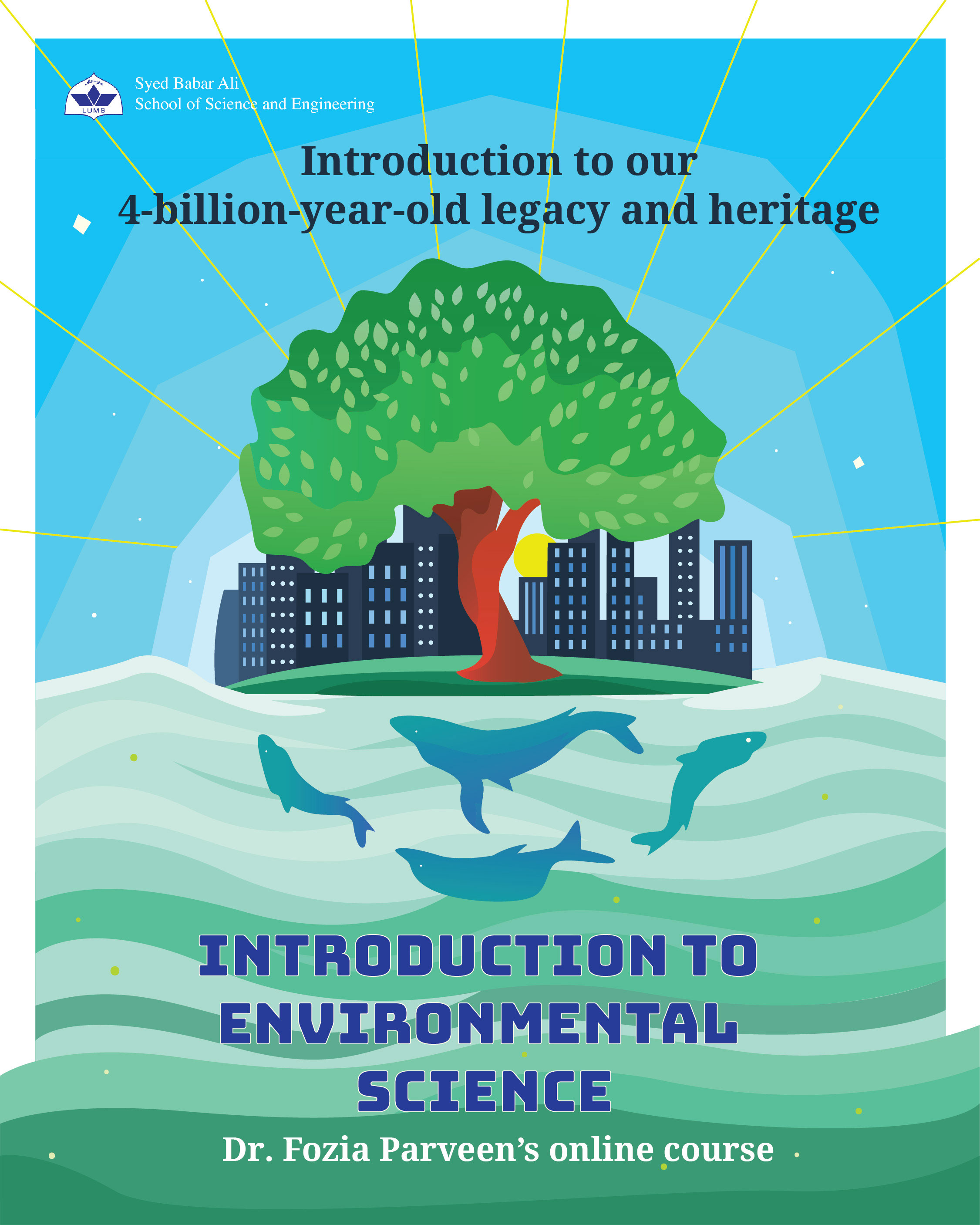
“Leave the planet better than we found it”. Does that ring a bell? Have you read this before? Although we are an insignificantly small twig on the grand tree of life, watered and nurtured by mother Earth, the acute protection of Earth’s biosphere is among our most cardinal responsibilities to nature. If we are to become a responsible citizen of the planet, understanding the tightly intertwined coexistence of life and its environment is crucial. It is like parting the curtains of ignorance and taking a peek into realisation that as much as the environment depends on what we do to it, we depend much more critically on what it does to us.
Dr. Fozia Parveen’s online course titled Introduction to Environmental Science, SCI103 for short, is your gateway to becoming a more responsible and sincere citizen of the greater biome we all share. The discussions are friendly, student-centered and engaging. This course includes lectures on the biosphere, biotic and abiotic ecosystems and the different types of environments that exist (terrestrial, aquatic, marine and freshwater). From the study of soil and air to how waste disposal is a shaping up to become a looming threat for our future generations’ health and well-being – the course also includes discussions on our local environmental problems and how global best practices can be morphed to suit our local needs and limitations. The course is an important component of the undergraduate program at SBASSE
Of all our doing in this brief phase of life and awareness, we are but to return the debt we have accumulated from consuming the flora and fauna over our lifetime. By helping establish a sense of community between the student and their larger environment, this course hopes to waft our sense of wonderment and responsibility to preserve this ecosystem and leave it indeed better than we had found it.
RESEARCH FOR COVID-19
Pursuit of Chalcones
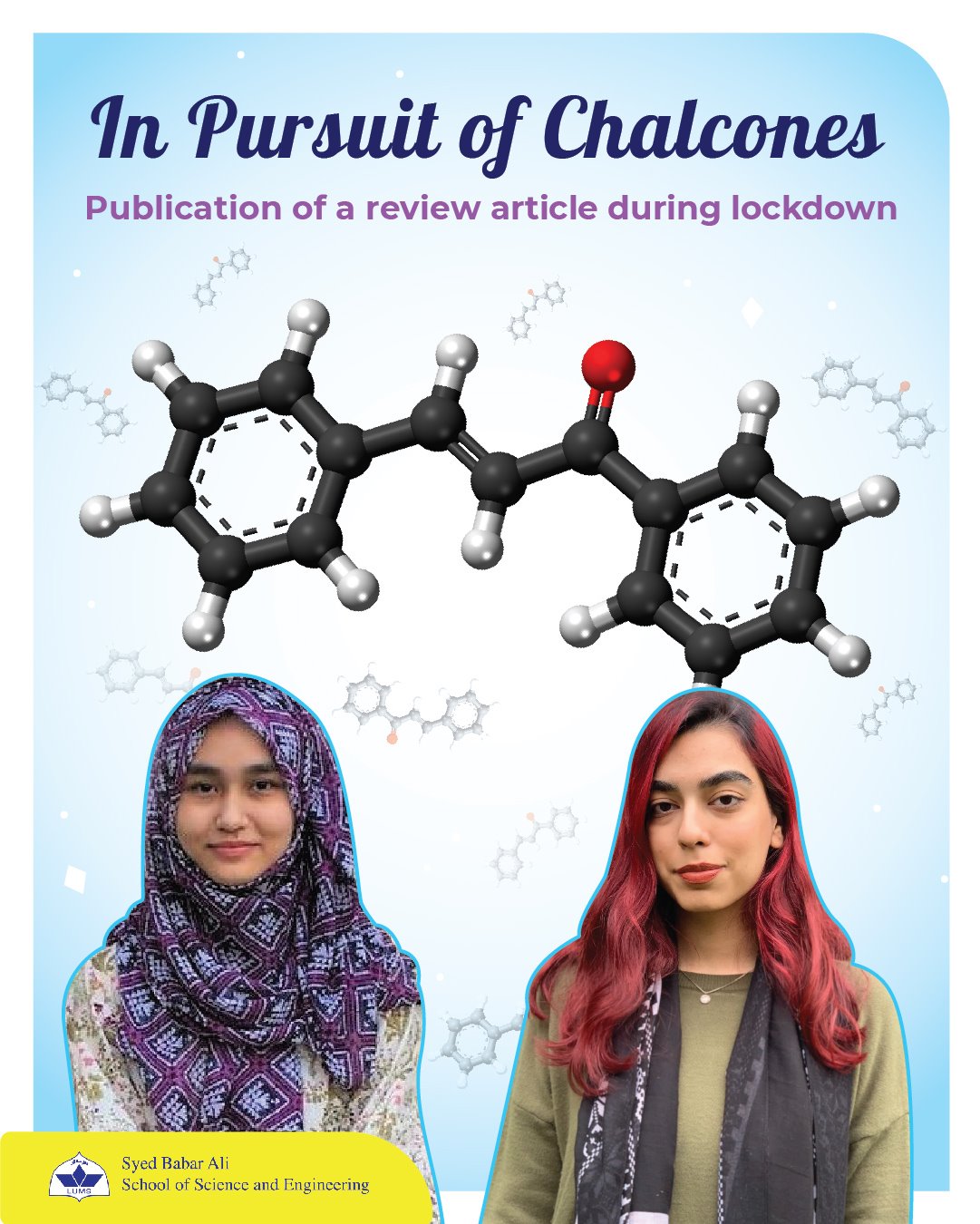
What have you been up to during the covid-19 lockdown? The battle of attrition between headspace and work routine has exhausted many, but motivated others. To err on the side of caution while staying home is surely safer for the body, but it has left the mind and the intellect unfulfilled. During this time, Rimsha Irfan and Shikufa Mousavi, who are SProj students of Dr. Rahman Shah Zaib Saleem, ventured out on an intellectual pursuit of fulfillment to gather literature on 300+ magical molecules known as Chalcones.
Initially led by Rimsha, the effort soon saw Shikufa join in. They worked to find and assemble a detailed literature on Chalcones, a family of plant derived compounds that are famous for their diverse application portfolio. Their effort culminated in the form of the publication of a review article titled “A Comprehensive Review of Aminochalcones”, in the open access journal Molecules. Structured like two rings attached with a thin bridge, Chalcones find important health applications in anti-cancer, antiviral, antibacterial, anti-inflammatory and antioxidant immunomodulation.
So, what have you been up to during the covid-19 lockdown?
The work of Rimsha and Shikufa can be seen here for further reading:
Irfan, Rimsha; Mousavi, Shikufa; Alazmi, Meshari; Saleem, Rahman S.Z. 2020. "A Comprehensive Review of Aminochalcones." Molecules 25, no. 22: 5381. https://doi.org/10.3390/molecules25225381
کورونا کے خلاف جنگ میں اہم پیش رفت
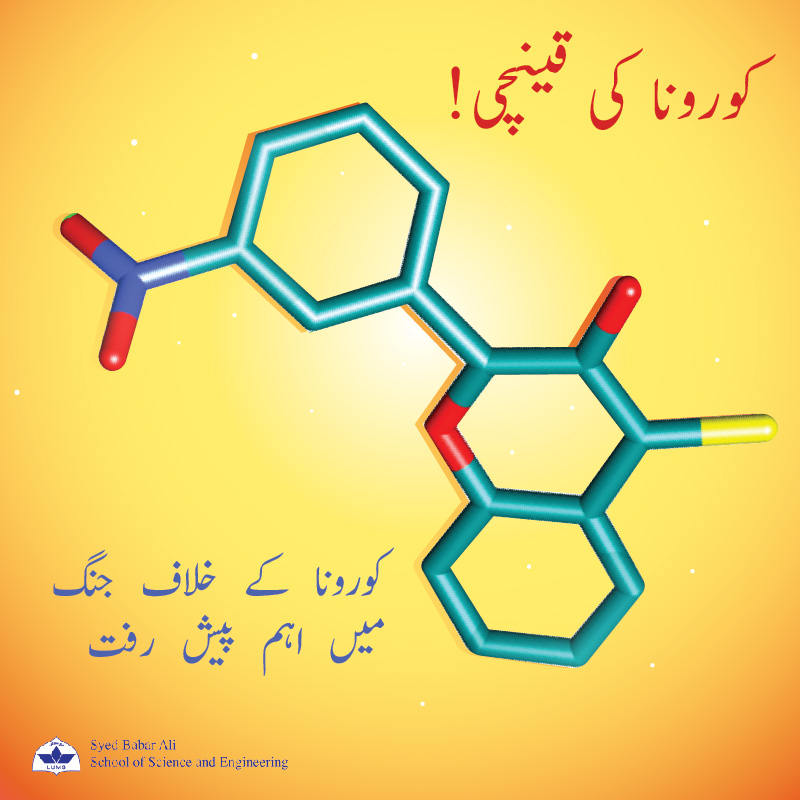
کورونا وائرس کی عالمی وباء نے جہاں انسانی ترقی کا امتحان لیا ہے وہاں ہماری خودارادیت کو بھی جھنجھوڑا ہے۔ ۲۰۲۰ شاید کورونا کا سال تھا مگر ۲۰۲۱ اس وباء کے خاتمے کا سال ہو گا۔ دنیا بھر کے بہت سے سائنسدان اس وائرس کے طریق واردات کو سمجھ کر اس کو مفلوج بنانے کی کوشش میں مصروف ہیں۔ لمز میں ڈاکٹر محمد سعید اور ان کی ٹیم، جن کا تعلق شعبہ کیمیا و کیمیائی انجنئیرنگ سے ہے، اسی عالمی کوشش کا حصہ ہیں۔ حال ہی میں ان کی تحقیق سے جڑی ایک اہم پیش رفت ہوئی جس سے یقیناً کورونا وائرس کو شکست دینے میں پیش رفت ہوگی۔ کورونا کی قینچی! جی ہاں۔ کورونا وائرس جب بھی کسی خلیے میں داخل ہوتا ہے تو اس کی پوری مشینری کو اپنے تابع کر لیتا ہے جس سے لاکھوں خلیے وائرس کی فوٹو کاپی مشینیں بن جاتی ہیں۔ اس طرح ایک کورونا وائرس نہایت چالاکی سے اپنے جیسے ہزاروں وائرس بنا لیتا ہے۔ ڈاکٹر سعید اور ان کی ٹیم نے دیکھا کہ وائرس کو اپنی کاپی بنانے کے لیے اہم پروٹین کی ضرورت ہوتی ہے۔ جب یہ وائرل پروٹین بنتے ہیں تو کپڑے کے تھان کی طرح لمبے طرز کے ہوتے ہیں جن کو کٹائی کے بغیر استعمال نہین کیا جا سکتا۔ یہ بالکل ایسے ہی ہے جیسےہم اپنے ناپ کے مطابق کپڑا کٹواتے ہیں، ورنہ وہ ہمارے کسی کام کا نہیں ہوتا ۔
اس مثال میں جو کام درزی کی قینچی کرتی ہے وہ وائرس کا ایک اہم کیمیائی خامرہ کرتا ہے جسے مین پروٹیز کہتے ہیں۔ ڈاکٹر سعید کی تحقیق کے مطابق اگر اس مین پروٹیز کو روک دیا جائے تو کورونا وائرس ہر خلیے میں گھس کر اپنے جیسے مزید لاکھوں وائرس نہیں بنا سکے گا۔ ڈاکٹر سعیداور ان کی ٹیم نے کورونا کی قینچی کو مفلوج کرنے والا ایک اہم کیمیائی عنصر ٹی-ایف-۹ کے نام سے دریافت کیا ہے جو کورونا وائرس کے مین پروٹییز کے ساتھ جڑ کر اسے بے اثر کرنے کی صلاحیت رکھتا ھے۔ ڈاکٹر سعید کا کہنا ہے کہ بد قسمتی سے پاکستان میں اس طرح کی تحقیق کرنے کے لیے تعلیمی اداروں کا بنیادی ڈھانچا کمزور ہے جس کی وجہ سےادویات کے شعبے میں ہمارے تحقیقی مقالوں کا معیار بہت سطحی ہوتا ہے اور عالمی برادری میں ہمارے تحقیقی نتائج کو خاطر خواہ پزیرائی نہیں ملتی۔ ڈاکٹر صاحب نے مزیدبتایا کہ ان چیلنجز کے باوجود لمز میں تحقیق کے لیے معاون ماحول موجود ہے جس سے تحقیقی عمل میں نہ صرف آسانی پیدا ہوتی ہے بلکہ اس کا معیار بہتر کرنے میں بھی مدد ملتی ہے۔ ڈاکٹر سعید نے یہ تحقیق اپنی پی-ایچ-ڈی طالبہ فروا بتول کی مدد سے مکمل کی۔ اس تحقیق کو مزید آگے بڑھانے کے لیےبین القوامی اداروں کے ساتھ اشتراک بھی حاصل کیا جا رہا ہے۔ ڈاکٹر سعید کا کام مندرجہ ذیل تحقیقی جریدے میں شائع ہونے پر ہم ان کو مبارک باد پیش کرتے ہیں۔
Tracing the Spread of Covid-19
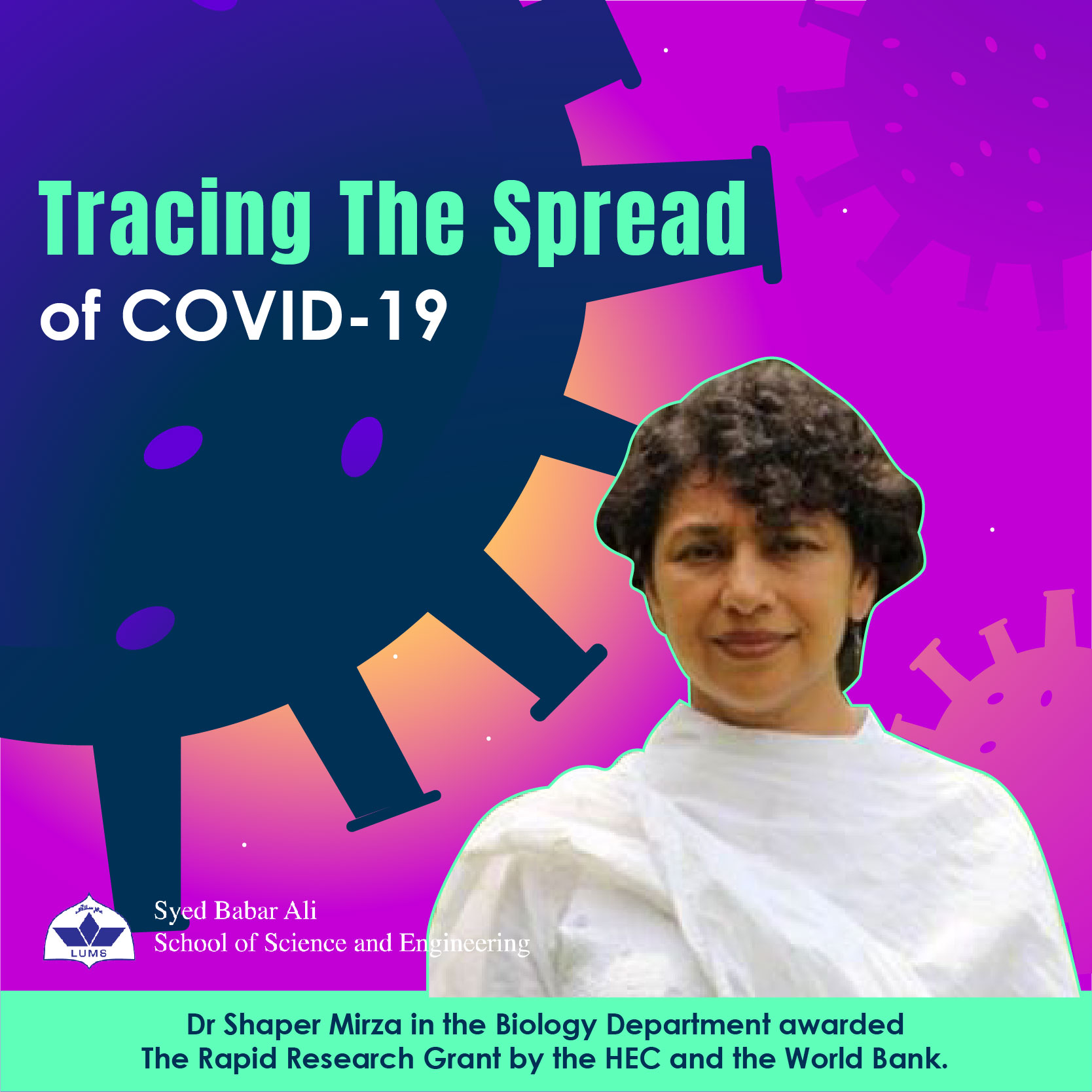
You react to pain, disease, joy and misery. We all do – we are chemical reactors with emotions and intelligence. The recent pandemic has affected millions of lives globally and hundreds of thousands in Pakistan. It is likely that you may know someone who has been directly or indirectly affected by COVID-19. The body reacts to disease and infection and this reaction can be monitored and traced, recorded and analysed. Our bodies are reactors – we can gain valuable information of how COVID-19 spread in different communities if we study these reactions and build an informed analysis on them.
Dr. Shaper Mirza and her team have recently been awarded 12 million rupees as a Rapid Research Grant by The World Bank and HEC, to conduct a study and dig out epidemiological patterns in how the human body responds to COVID-19 infection. The purpose is to help guide doctors and researchers for better clinical decision making for this disease. Dr. Shaper is the only recipient of this grant from LUMS!
For this project, while local collaborators provide mathematical and computational modelling support, others contribute to patient recruitment, expertise and resources in viral culture and provision of access to demographic and anthropological data. Meanwhile, international partners from US and UK provide HLA typing of patients and consultation on immunological assays. This partnership will eventually help seep findings to inform policies for community surveillance of COVID-19.
This is an active case of scientific investigation. Detective work, critical analysis of data, finding clues and eventually tracing epidemiological patterns of COVID-19. 1400 grams of grey matter wrapped around in membranes, fluids and bone may look quaint next to the empires it can architect and the technologies it can innovate. However, no one can deny the extraordinary things it can help us achieve when we collaborate and combine forces, interests and ambition to create solutions for a better tomorrow. We wish Dr. Shaper well in her project!
Bind, Block and Bury - Research grant to help block SARS-CoV-2 viral proteins
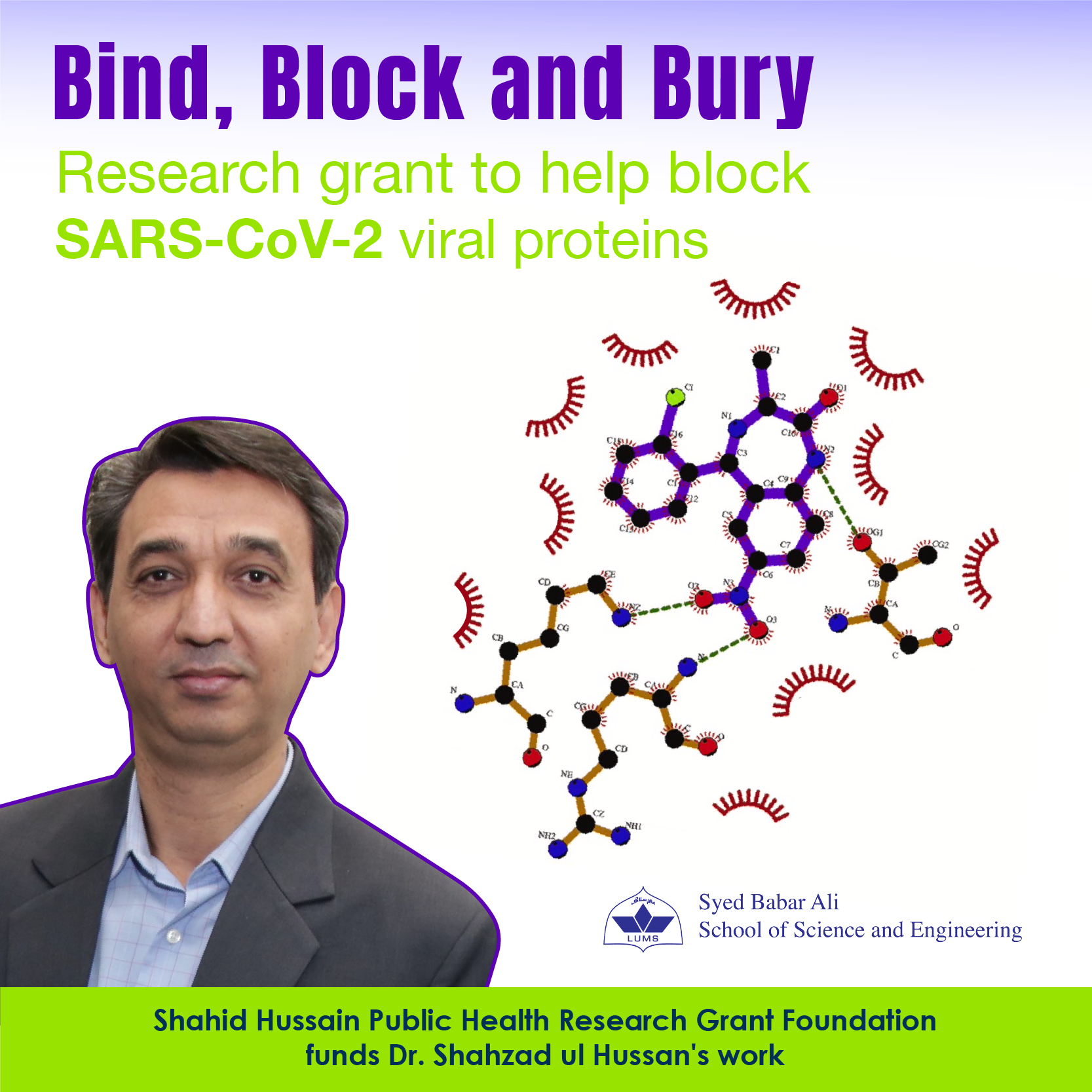
Raise the fences – increase defenses. Block infiltration stop proliferation. These are one-point agendas that guide Dr. Shahzad ul Hussan’s latest work to arrest the workings of SARS-CoV-2 virus (more popularly known as ‘the coronavirus’ these days). Dr. Hussan is working to find a molecule that can bind to either of the viral proteins; RdRp, 3CL-protease and helicase, to help disable the sinister virus and its hopefully end its terrible reign.
However, first things first - our sincerest congratulations to Dr. Shahzad ul Hussan for receiving the Shahid Hussain Public Health Research Grant 2020, for “Discovery of New Potential Therapeutics Against Coronavirus by Targeting Viral Cellular Entry and Replication”. In simpler words, Dr. Hussan is looking to find ways to 1) prevent the entry of the SARS-CoV-2 virus into the human body and 2) stop it from multiplying if it gets inside.
Dr. Hussan established the Biochemistry and Structural Biology (BSB) lab at the Department of Biology, SBASSE, which helped his past work in discovery of drugs related to HIV and Hepatitis C. He believes this laboratory, and the grant he has received, shall help him conduct further research to figure out a that one killer molecule, disabling the normal workings of SARS-CoV-2. We wish Dr. Shahzad ul Hussan the very best in his search to find the ‘COVID killer’ molecule.
A Posteriori – Providing Better Health Care Through HL7 Integration
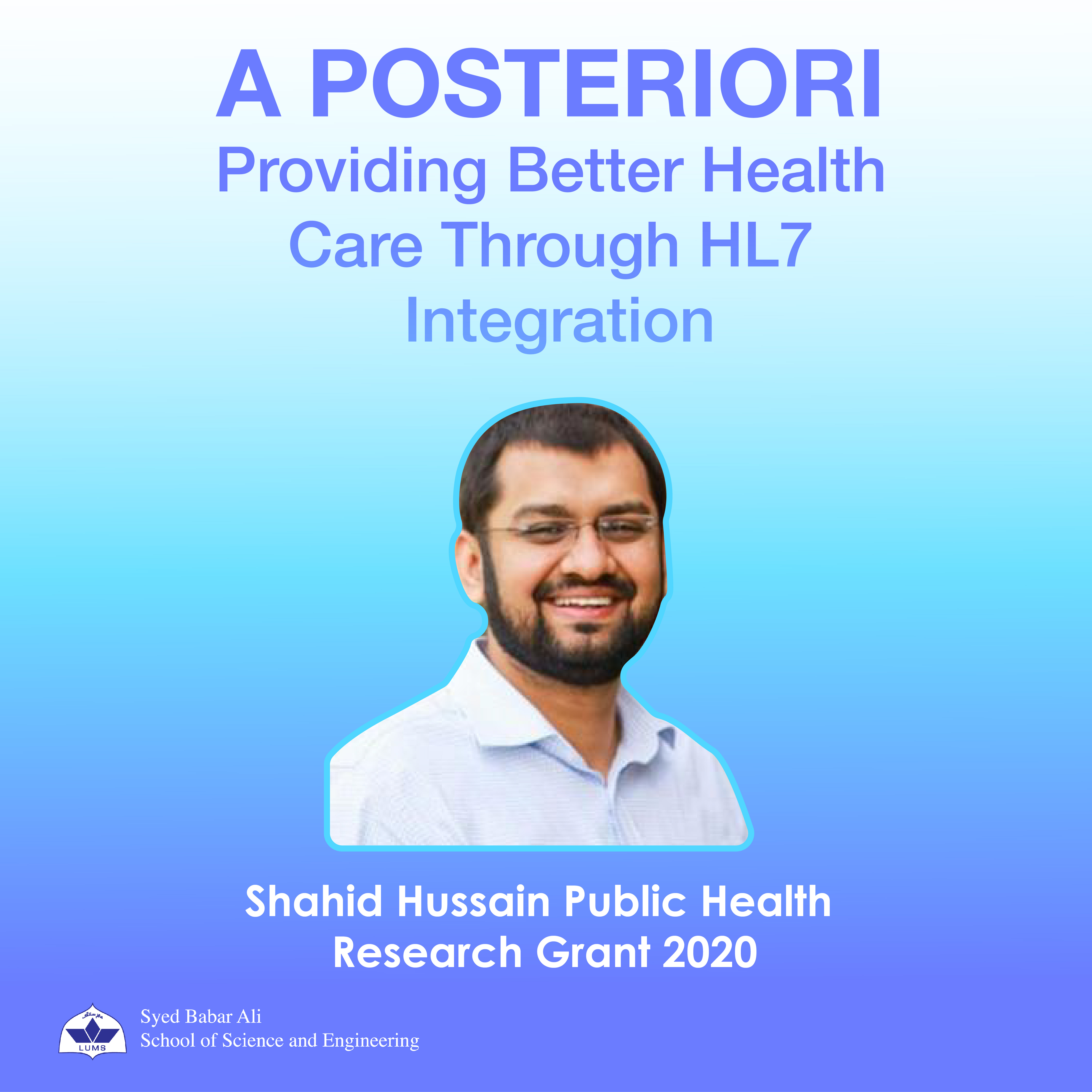
The strength of a system is tested when it is passed through a test. We’re not divorced from this idea and regularly validate it through the act of living and survival. Unfortunately, when COVID-19 pandemic was nearing its peak in summer of 2020, our healthcare system was just not ready to handle the pressure of primary and secondary healthcare services including immediate bedside treatment and post-hospital patient care and management. A distraught public health system and disgruntled public – things need to change and there is hope!
That hope is Dr. Safee Ullah’s work which has been recognised through the prestigious Shahid Hussain Public Health Research Grant! This is great news because it means that Dr. Safee Ullah and his team will be able to develop a framework to seamlessly integrate healthcare data with all stakeholders of the health care system around the country and in doing so – help save millions of lives and financial resources!
Dr. Safee’s strategy relies on integration of healthcare data through the international system HL7 i.e. Health Level Seven International. This will be achieved through a three-pronged strategy; 1) Evaluation of compatibility of the HIMS (Health Management Information Systems) database, 2) Implementation of data adapter and 3) Demonstration of prototype.
Dr. Safee intends and hopes to work closely with Shalamar Hospital for exchange, storage and retrieval of health care information data to improve and strengthen the healthcare sector of the country. We congratulate and wish him success in this project!
Critical Combo - COVID-19 and Mathematics
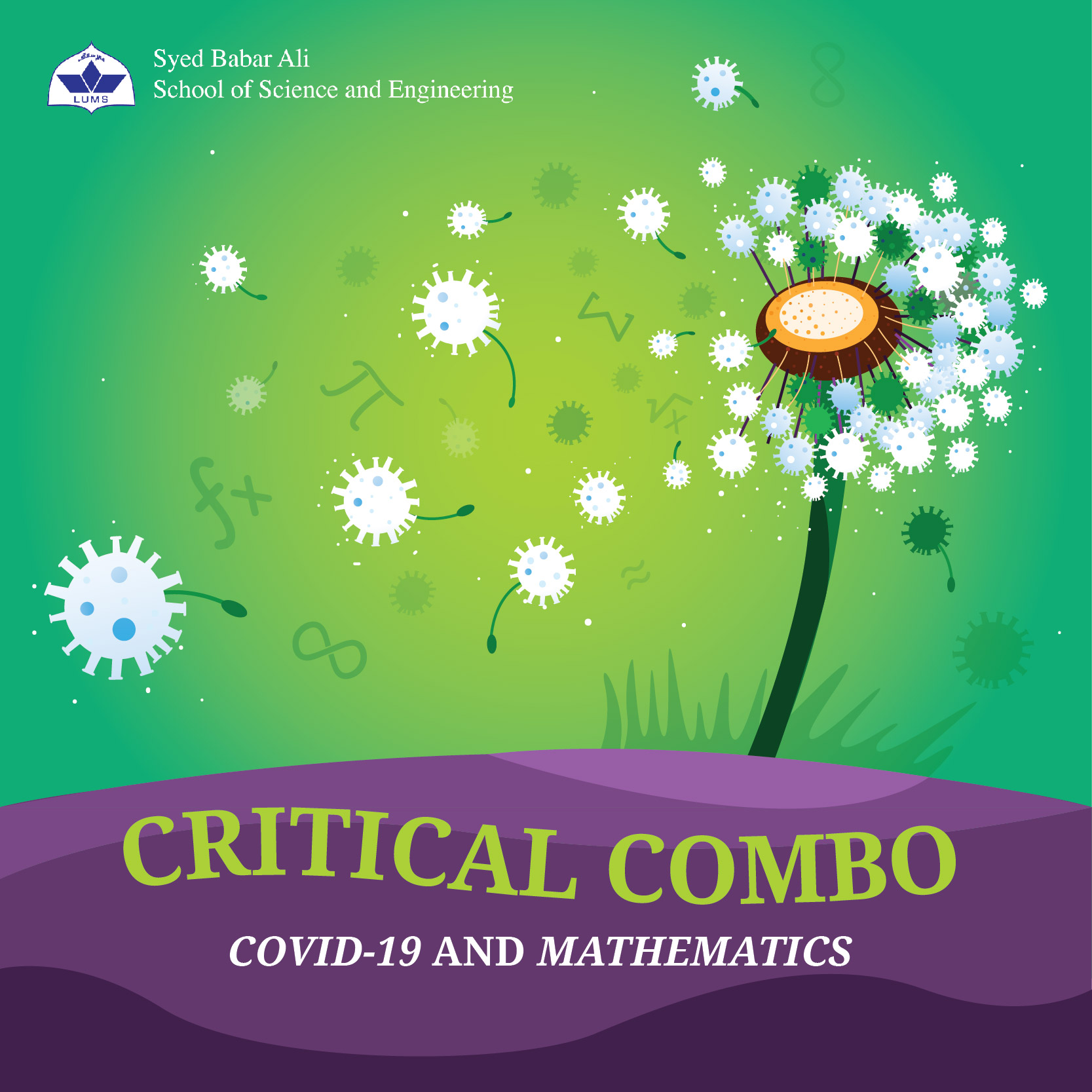
The COVID-19 pandemic has pushed us all back to the drawing board to reconfigure our strategy for healthcare monitoring and preparedness. Like a commander watching his battalion in need for a massive backup, we have explored backup plans, deployed rapid response measures and have invested a fortune to try and understand more about the transmission, progress and management of this disease. At last, we’re bringing math to the mix!
Mohsin Ali, from the Department of Mathematics, SBASSE LUMS, along with Adnan Khan have been part of a team who’ve scrutinised transmission dynamics of COVID-19 through mathematical modelling and have tried to understand the significance of pharmaceutical intervention in the deployment of a strict lock down, which may help guide public healthcare policy.
Using realistic parameters in rate and efficacy of treatment through medication, the team learned that the time for quarantine is significantly reduced and that quarantine may still be needed albeit for a smaller, more specific population. The study compared control strategies (quarantine and isolation) both when medication was available and when it is not. In terms of coming up with theorems, using beautiful but complex equations to gauge parameters and to visualise results with beautiful plots – no stone was left unturned. From the theory of optimal control by Lev Pontryagin, to developing R0, a parameter that shows status of the outbreak in the model – this detailed study has concluded that premature relaxation in lockdowns and social distancing will result in greater disease numbers and has recommended against this relaxation.
This work is published in the journal ‘Letters in Biomathematics’ and can be found here: https://lettersinbiomath.journals.publicknowledgeproject.org/index.php/lib/article/view/365
Reference: Ali, M.; Imran, M.; Khan, A. COVID-19: Can Medication Mitigate the Need for a Strict Lock Down?. Lett. Biomath. 2020.

